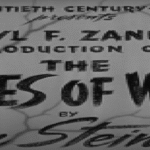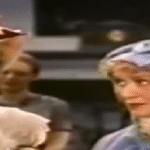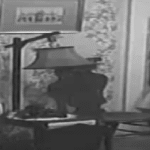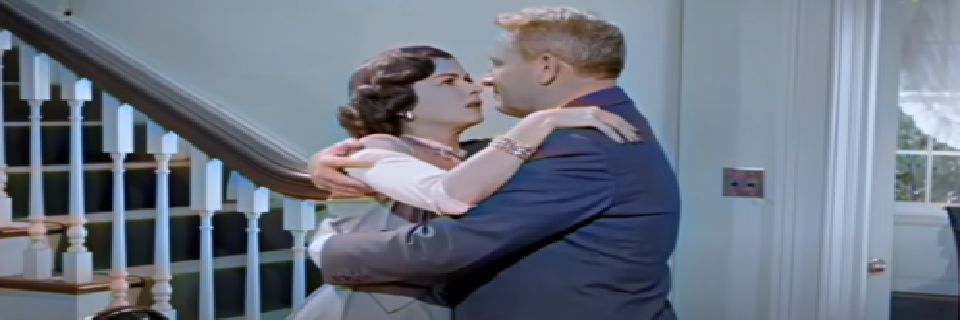Released in 1951 and directed by Vincente Minnelli, Father’s Little Dividend picks up where Father of the Bride left off. Once again led by the incomparable Spencer Tracy as the flustered but lovable Stanley Banks, and Elizabeth Taylor as his newlywed daughter Kay, the film dives into the chaos, comedy, and tender confusion that follows when a young couple announces they’re expecting a child—and the reluctant transformation of a father into a grandfather.
At the start of the film, Stanley Banks is finally catching his breath after the whirlwind that was his daughter Kay’s extravagant wedding. Still recovering financially and emotionally, Stanley hopes for a return to quiet normalcy. But that calm is shattered when Kay (Elizabeth Taylor) and her husband Buckley Dunstan (Don Taylor) announce they’re going to have a baby.
Stanley’s immediate reaction is a mixture of disbelief, dread, and egotistical panic. Though he tries to feign joy, he’s horrified at the thought of being called “Grandpa.” His internal monologue, a signature comedic touch carried over from the first film, gives viewers access to his grumbling and humorous anxieties about aging, diapers, and the general indignity of being associated with the older generation. While his wife Ellie (Joan Bennett) is delighted and quickly begins planning for the baby’s arrival, Stanley finds himself spiraling into a midlife crisis of sorts.
Adding to the turmoil is the tension between the Banks and Dunstan families. Mrs. Dunstan (Billie Burke), Buckley’s high-society mother, envisions an over-the-top nursery and an opulent upbringing for the unborn child, complete with expensive furniture and lavish expectations. Her grand plans immediately clash with Stanley’s down-to-earth sensibilities, rekindling the in-law rivalry from the previous film. The comedic contrast between the two families—a grounded, modest middle-class clan and a socially ambitious, moneyed one—provides rich ground for both satire and sincerity.
As Kay’s pregnancy progresses, so does Stanley’s discontent. He feels increasingly left out, particularly as his wife and daughter share the kinds of mother-daughter moments he can’t penetrate. He tries, often clumsily, to insert himself into the preparations. A comical episode unfolds when Stanley takes it upon himself to paint the nursery, only to make a mess of it and be told kindly but firmly that his help isn’t exactly needed. Like many men of his generation, Stanley finds himself bewildered by a process that, while emotionally significant, seems to have no clear role for him to play.
Stanley’s anxiety and jealousy come to a head when Kay, now heavily pregnant, chooses to stay at her in-laws’ home during the final weeks before the birth. Feeling abandoned and irrelevant, Stanley mopes around, delivering deadpan monologues about his impending descent into obsolescence. Yet, his brooding is punctuated with moments of surprising insight and vulnerability, which ground the comedy in genuine emotion.
Then, without warning, the phone call comes—Kay has gone into labor. Stanley, in a rush of concern and adrenaline, bolts out the door to be at the hospital. This moment, played for both laughs and sentiment, becomes a turning point. He arrives just in time to wait nervously with Buckley and Ellie, pacing the halls, his earlier doubts and fears fading as concern for his daughter takes precedence. When news finally arrives that Kay has delivered a healthy baby boy, Stanley’s transformation is complete.
The final act of the film centers on Stanley coming to terms with being a grandfather. After all his resistance and insecurities, he finally meets his grandson—and it’s love at first sight. The scene is tender, underscored by Spencer Tracy’s unmatched ability to convey complex emotion with subtle gestures. Holding the tiny baby, Stanley’s earlier objections feel trivial. He realizes that the title of “Grandpa” isn’t something to fear, but something to cherish.
But in classic Father of the Bride fashion, even this moment of serenity isn’t without a hiccup. When Stanley is left alone with the baby for just a moment, he loses track of the child during a mix-up at the park. What follows is a frantic—and hilarious—search through the neighborhood that showcases Tracy’s comedic chops and adds one last bit of tension before the film’s resolution. Ultimately, the baby is safely returned, and Stanley’s status as a grandfather is humorously but firmly solidified.
Father’s Little Dividend ends on a warm and optimistic note. The Banks and Dunstan families come together to celebrate the new arrival, their earlier conflicts smoothed over by the shared joy of new life. Stanley may not have planned for any of it—nor welcomed it at first—but he finds a new kind of pride and happiness in his evolving role.
This sequel works because it doesn’t just repeat the formula of the first film. Instead, it deepens the character of Stanley Banks, showing us a man wrestling with the passage of time, shifting family dynamics, and his own sense of place. While the first film focused on letting go of a daughter through marriage, Father’s Little Dividend is about embracing change through generational growth.
Spencer Tracy’s performance remains the emotional heart of the film. His comedic timing is flawless, but it’s the quiet moments—the way he watches Kay from a distance, or holds his grandson for the first time—that give the film its staying power. Elizabeth Taylor, luminous as ever, portrays Kay with grace and maturity, showing how the character has grown into her new life.
The direction by Vincente Minnelli brings warmth and visual polish to the story, while the script (co-written by Frances Goodrich and Albert Hackett) remains sharp, funny, and filled with empathy. It never slips into sentimentality, instead balancing comedy and heart in a way that feels authentic.
In the end, Father’s Little Dividend is more than just a family comedy—it’s a meditation on aging, pride, and the reluctant acceptance of life’s milestones. It’s a film that reminds us that love, family, and the messiness in between are what give life its richest meaning. Even when the journey toward acceptance involves a few pratfalls and a lost baby or two, it’s one worth taking.







